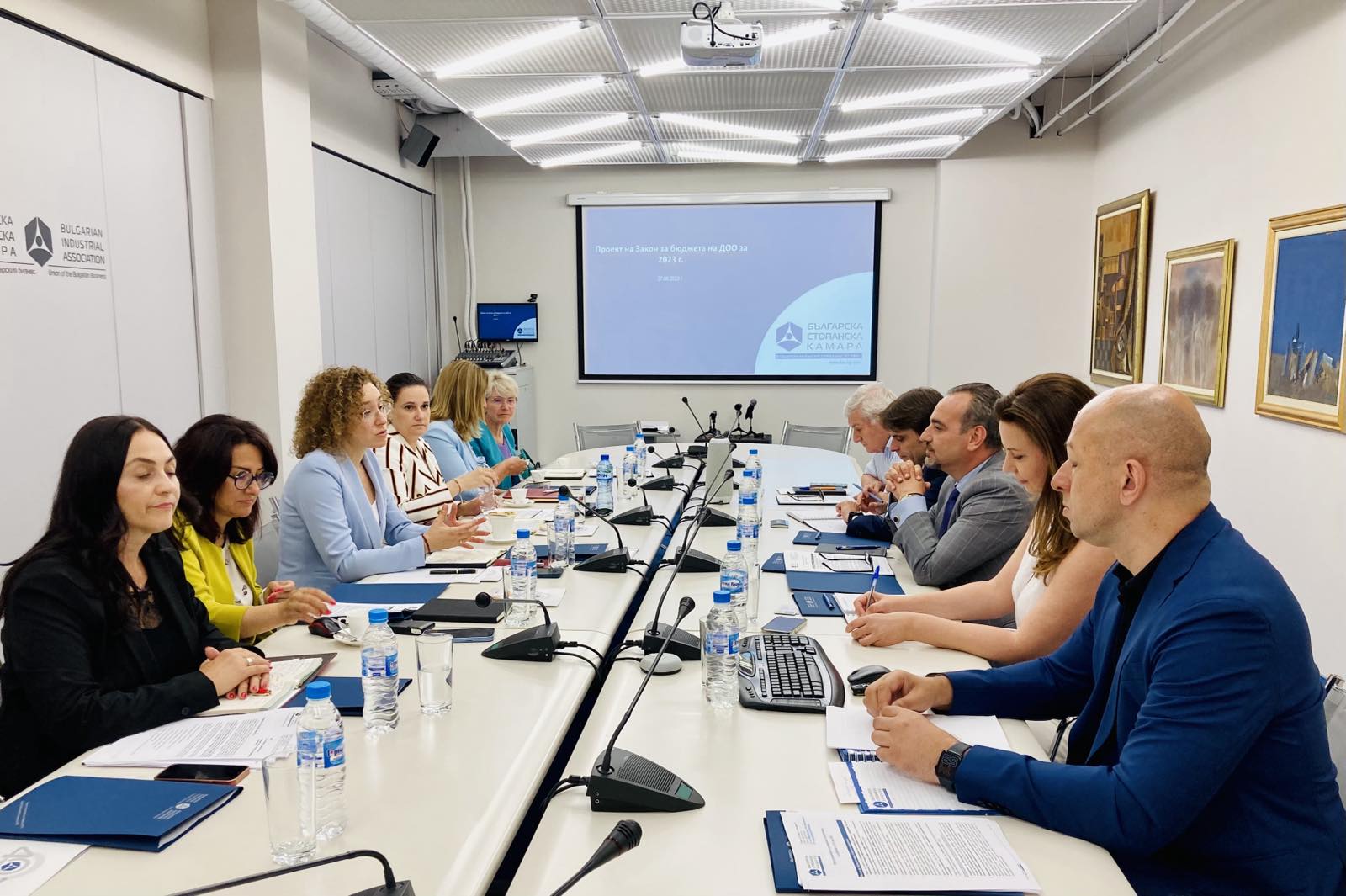The priorities of the Bulgarian Industrial Association (BIA) in the field of labour market, income, social policy and social security were presented to the Minister of Labour and Social Policy Ivanka Shalapatova, who visited BIA at the invitation of the management of the Association.
The meeting was attended by Dobri Mitrev - President of the Board, Maria Mincheva – Vice President, Stanislav Popdonchev – Vice President and Chief Financial Officer, Grigor Dimitrov - Chief Director of Industrial Relations, and Shteryo Nozharov - Economic Advisor. Minister Shalapatova was accompanied by Deputy Ministers Maya Vassileva, Nikolay Naydenov, Ginka Mashova and Desislava Stoyanova, the Minister's advisors - Elka Nalbantova and Georgi Naydenov, as well as Snezhana Apostolova - Head of the Minister's Office.
"Our understanding is that social dialogue should be based on partnership relations - very direct and straightforward communication, with arguments," Minister Ivanka Shalapatova said. She specified that in the next two weeks the leading team of the MLSP will hold meetings with all social partners.
BIA President Dobri Mitrev emphasized the long-standing active partnership between BIA and the MLSP and presented the Association’s main expectations in the field of labor and social policy. He stressed the need to improve the mechanisms for forecasting the needs of certain professions, skills and competences of the workforce, as well as comprehensive policies and measures for the labour and social integration of young people (especially from vulnerable groups), limiting undeclared work and promoting flexible forms of work. Dobri Mitrev stressed the need for changes in the labour legislation in order to solve a number of problems businesses have been facing for years, related to working hours and holidays, the responsibility of employers in different hypotheses when various circumstances are beyond their control, the determination by the Council of Ministers of the amount of additional payments to the wage, the provisions related to collective bargaining and collective labour disputes, as well as the procedure for representation. Amendments are also needed in the area of legislation governing labour migration and labour mobility. "The shortage of labour on the Bulgarian labour market requires special attention to the regulation of the import of workers from third countries," Dobri Mitrev said.
"It is necessary to predict skills, not professions," said BIA Vice President Stanislav Popdonchev, who presented the information system for competency assessment MyCompetence, developed by BIA with funding under OP "Human Resources Development". He expressed hope that the MLSP will continue to build on the established national system so that it is useful for the development and assessment of skills and competencies of the workforce.
Maria Mincheva - Vice President of BIA, emphasized the need to abolish the approach adopted in Article 244 of the Labor Code for automaticity in determining the minimum wage (MW). She once again noted that the setting of the minimum wage should be done taking into account all international agreements undertaken by the Republic of Bulgaria, as well as in accordance with their implementation. Maria Mincheva informed that the employers' organisations have already officially referred this issue to the European Commission and the International Labour Organisation. "The MLSP has not been part of the dialogue in recent years, but only a host. This has been a brake on policy-making for many years," Maria Mincheva noted.
Among the topics discussed was the state of the social security system, stressing the need to propose short, medium and long-term solutions covering all three pillars of the pension system. "It is unacceptable that changes in the social security system are used for political purposes," stressed prof. Grigor Dimitrov - Director General of Insurance Relations at BIA. According to him, policies on updating the size of pensions should be linked to the strict observance of the basic principle of the solidarity pension system - the pension should be determined according to the person's contribution to the pension system. "There is a need for an analysis of the pension system, which no one has bothered to do. We have no scope of our objectives. At the moment, 65 cents per 1 lev pension comes from the state budget," Grigor Dimitrov stressed. He added that income growth should be based on investment and economic growth, not on increasing social security contributions - this is the main disagreement between employers' and trade unions' organisations.
Minister Shalapatova undertook that the team led by her will thoroughly review the proposals and propose appropriate solutions as soon as possible. She also accepted the invitation to participate in a discussion forum organized by the BIA in the autumn of this year, dedicated to the problems in pension insurance relations. The Social Minister informed that the EU Commissioner for Jobs and Social Rights, Nicola Schmitt, has committed to assist the MLSP in the forthcoming analysis of the pension system with information on good practices to improve the pension system in other EU member states. "The World Bank did such an analysis 10 years ago, but to date it is not up to date," said Minister Shalapatova. A completely new Employment Promotion Act is also being worked on.









